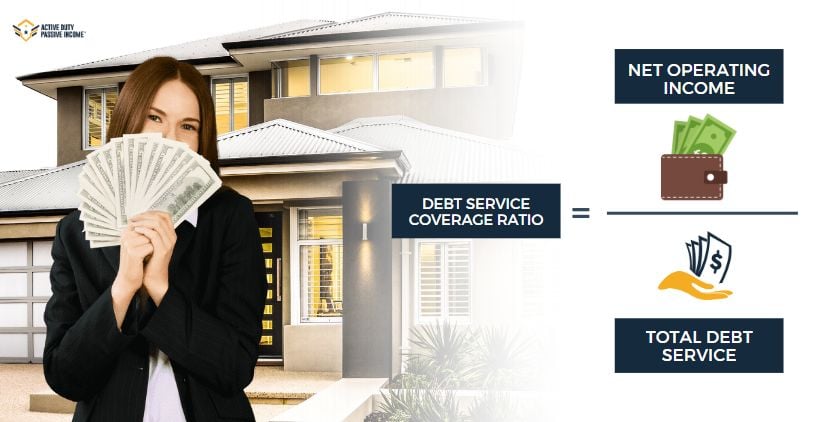DSCR, Debt Service Coverage Ratio loans can be an incredibly useful tool for an investor who wants to qualify using the property’s potential vs their own credit.
Now of course that doest come without some requirements applied by the banks but as long as the asset meets the DSCR requirements this option can be a dream come true to pick up loans left and right with a down payment! Interest rates will vary depending on the lender and the lenders will have different requirements but let’s get familiar with what the overall concept is and see if you too can pick up a DSCR loan to add another property to your portfolio!
What is Debt Service Coverage Ratio (DSCR)?
The debt service coverage ratio in real estate is used by lenders and investors when it comes to measuring the cash flow that is available to cover the mortgage of a property. A good debt service coverage ratio indicates the property has strong potential for profitability and low risk of not being able to pay the monthly payments. It helps the lending team understand how much money is really being generated and whether they will have an adequate return on their investment. Let’s say you find yourself in a situation where you do not want to exercise a traditional financing method, this is a viable solution for you to explore. There can be many reasons you may want to use this loan, to include but not limited to; they are typically quicker and they do not count against your 10 maxed Fannie and Freddie loans which makes the amount unlimited that you can get as long as you qualify! Let’s continue understanding the scope of the DSCR below.

DSCR Loan Example
How to Calculate DSCR?
If a property generates $100,000 in net operating income per year and has an yearly mortgage payment of $75,000, the DSCR would be calculated as:
DSCR = Net Operating Income / Annual Debt Payment
DSCR = $100,000 / $75,000
DSCR = 1.33
Don’t worry if this seems a little complicated we will break it down gradually below.
What Is A “Good” DSCR?
In the example above, the DSCR is 1.33, which indicates that the property generates enough cash flow to cover its annual debt payments with a little extra cushion, 33% more operating income than the minimum payments. A 1.0 DSCR would mean its covering its debt obligations anything more than that means its generating a profit. A higher DSCR indicates a lower risk of being able to pay the payments, while a lower DSCR indicates a higher risk of not being able to.
A good DSCR can be considered 1.5 or above; banks generally want to see 1.2 at a minimum.
A high DSCR ratio indicates that there is a greater amount of Net Operating Income (NOI) available to pay off the mortgage. This ratio is important in determining whether a property can generate enough revenue to cover its mortgage payments.
What are Debt Service Coverage Ratio Loans?
The DSCR loan is intended for Investors who want to qualify for a mortgage based on the cash flow produced by their investment property, instead of using traditional income verification methods such as tax returns, pay stubs, and employment information that a normal traditional loan needs. These are a great option if you have maxed out your debt to income ratio needed for traditional financing and spot a great deal that you want to take advantage of but cannot because you will not pass standard underwriting features. The DSCR loan doesnt need your employment history, W-2’s, or tax returns, which is a big relief for people using this as an option and why it is so popular.
How Can You Qualify for a Debt Service Coverage Ratio (DSCR) Loan?
Qualifying for a Debt Service Coverage Ratio (DSCR) loan is based on the borrower’s ability to generate enough cash flow to repay the loan. Here are some factors that lenders typically consider when evaluating a borrower’s eligibility:
- Debt Service Coverage Ratio (DSCR): Lenders typically require a minimum DSCR of 1.2 to approve a loan. (use the equation above to determine that number)
- Property Type: The property must be an income-producing property, such as a rental property, commercial property, or multifamily property.
- Credit Scores will be looked at.
- Cash Reserves: Lenders may require the borrower to have cash reserves to cover unexpected expenses or vacancies. Normally around 5% or more of the purchase price.
- Property Value: The property’s appraised value is an important factor in determining the loan amount and the borrower’s eligibility for the loan. If it has an upside down appraised value chances are the lender will not lend on the loan.
- Experience: The borrower’s experience in managing income-producing properties may also be considered. Lenders want to see that the borrower has experience and if they do not have experience the lender may be lenient on smaller sized income producing properties.
Where can I get a DSCR Loan
DSCR loans are offered by commercial and multifamily specific lenders, including banks, credit unions, and private lenders. Note that smaller banks may not offer these types of specialized loans. It’s important to call around and find out who offers these in your area. You can also call around at large national banks, but they typically have higher rates and more requirements than regional or smaller bank/credit unions.
Lender Shopping Tips
Questions you should be asking lenders about their specific requirements for a DSCR loan:
- What DSCR ratio do you require for XYZ asset type and what are the current interest rates?
- How much experience do I have to have to qualify for this loan at your bank?
- What type of customer service options do you have, is it an automated phone tree or will I speak to a real person?
- How long will closing take on this type of loan?
- What loan terms can you offer me on this loan?
- Is there a better product that you can suggest for my current situation?
DSCR Loan Requirements
The coverage ratio is the most important factor for this loan. Lenders want to see 1.2 DSCR lower ratios are acceptable, but you may have to make a higher down payment of 25-30% to get the loan.
At that point it may be better to look for other options. Loan to value ratio needs to be 80% or more. The higher the (LTV) the less of a downpayment you will have to make. Lenders also want to see that you have experience and have or have had an income producing property in the past or you currently have at least one at time of application. One way that I have captured this in the past is along with my documents to qualify as requested I will show the bank a slideset of a property I have managed and what the costs are broken down. This helps show that I am aware of how to manage. In some cases this can just be the primary that you have turned into a rental; it does not have to be a full portfolio of rentals. Make sure you ask the lenders what their expectations are when it comes to past real estate activities so you know that your current position will hold you through the process of applying and getting the loan!
How to apply for a DSCR loan
To apply for a Debt Service Coverage Ratio (DSCR) loan, you will need to gather required documents such as, the property information, rent rolls, projected income, signed lease agreements, and appraisal reports. Research potential lenders that offer DSCR loans and compare their loan terms, interest rates, fees, customer service, hospitality and eligibility criteria. Submit an application to the lender that you think is the best fit.
Pros And Cons of DSCR Loans
Pros:
- Personal income is not taken into account
- Quicker application and closure times
- Can commit to several properties at the same time
- Good for beginners and seasoned
Cons:
- Down Payment 20-25%
- Service Fees ranging from .5%-1% of loan amount
- Higher interest rates (generally 1-2% above market rates)
- Needs to have rented units otherwise higher interest rate for being vacant
How many DSCR loans can you have
DSCR amounts are unlimited as long as you meet the lender’s needs when it comes to the down payments and trust verification. With that being said, by putting yourself on a schedule to save up or find that downpayment with a partner you can continue to pick up rentals.
At Active Duty Passive Income, ADPI we are invested in teaching our students not only how to utilize tools but we also know the value of networking. We have so many success stories of investors who end up linking up with one another to pick up both single family and multifamily units! After all, a few sets of eyes studying markets and being fully qualified to execute a deal when they find it can be the deal maker for a seller and a buyer!
Frequently Asked Questions:
1. Are DSCR Loans hard to get?
They can be harder to get than a regular loan because of the ratio required for the asset to qualify. If the asset meets the 1.2 DSCR that is the biggest hurdle to overcome. Constant market analyze is the key to getting the numbers right and getting the loan.
2. Are DSCR Loans 30 years?
These loans can be 30 or 40 year fixed or interest only terms.
3. What type of property can I buy with a DSCR Loan?
Income producing assets to include single family, multifamily, commercial properties.
4. Can I buy Investment properties with DSCR?
Yes, DSCR loans are designed specifically for investment properties, such as rental properties or commercial real estate. These loans are used by real estate investors to purchase properties that generate income through rent or other revenue streams.
5. Do you need a down payment on the DSCR loan?
Yes, a down payment is typically required for a DSCR loan. The amount of the down payment can vary depending on the lender’s requirements and the specific property being purchased. A rule of thumb is 20-25% depending on the risk of the asset from the lender’s eyes.
6. What are the Benefits of a DSCR Loan?
- Access to higher loan amounts upwards of $4 million
- Longer loan terms, up to 40 years
- Flexibility to customize loan terms
- Application and closing times are generally faster than traditional loans
ADPI Pro Tips
- If you find yourself being stuck because your debt to income ratio is too high and you cannot qualify for a traditional loan, a DSCR loan may be a viable option for you.
- If you want to buy or refinance an investment property but do not have enough personal income to be accepted or do not want to give their tax, financial, and job paperwork you may be a candidate for the DSCR loan.
- By opting for a DSCR mortgage, there may be instances where you can access a greater amount of money from an investment property under a DSCR program compared to what you could obtain with a conventional non-owner-occupied loan.
This blog was written in collaboration with our absolutely amazing DoD SkillBridge employee: David









